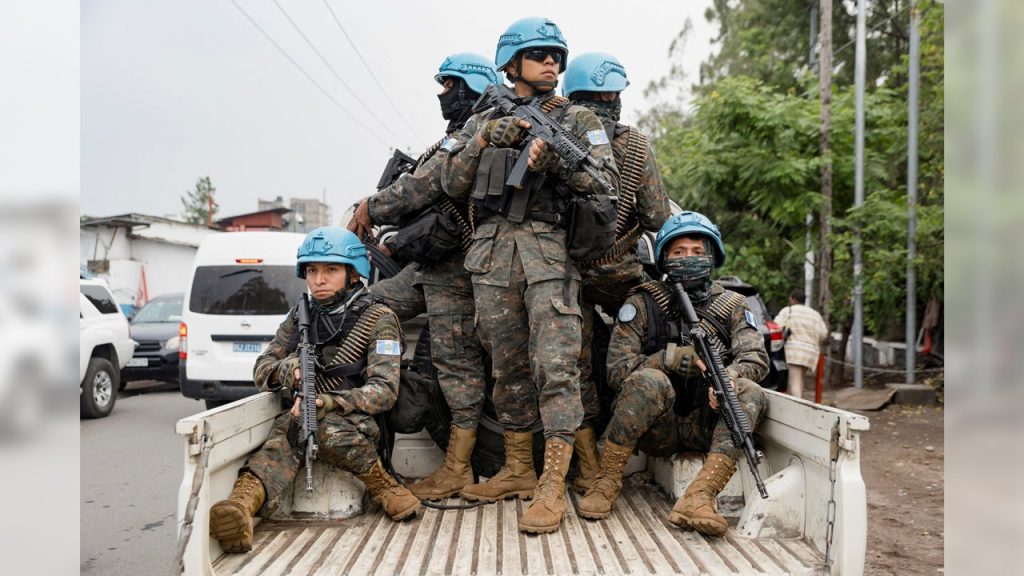The escalating conflict in the Democratic Republic of Congo (DRC) has reached a critical juncture, with the Rwanda-backed M23 rebel group advancing on the strategically important city of Goma. This renewed offensive has triggered the evacuation of Goma’s international airport, disrupted commercial flights, and displaced thousands of civilians. The fighting underscores the volatile security situation in eastern DRC, a region plagued by numerous armed groups and a protracted humanitarian crisis. International condemnation of Rwanda’s alleged support for the M23 has intensified, further straining diplomatic relations between the two countries. The United Nations and other international actors are urging an immediate cessation of hostilities and a withdrawal of M23 forces, but the situation remains tense and uncertain.
The M23 rebellion, primarily composed of ethnic Tutsis, is not a new phenomenon in the DRC. The group emerged from a previous mutiny within the Congolese army over a decade ago. While M23 claims to be fighting for the rights of the Tutsi minority, it has been widely accused of committing human rights abuses and fueling instability in the region. Rwanda’s alleged backing of the group, despite denials from Kigali, has added a complex geopolitical dimension to the conflict. The presence of Rwandan troops and military equipment in eastern DRC, ostensibly for security purposes, has raised concerns about Rwanda’s true intentions and its role in exacerbating the conflict. The DRC’s decision to sever diplomatic ties with Rwanda highlights the deep mistrust and animosity between the two nations.
The humanitarian consequences of the renewed fighting are dire. Thousands of civilians have been forced to flee their homes, seeking refuge in displacement camps or attempting to cross the border into Rwanda. The Kanyaruchinya camp, located near the Rwandan border, has seen a mass exodus of displaced people fearing for their safety. The already fragile humanitarian situation in the region is further strained by the ongoing conflict, with many facing food insecurity and limited access to basic necessities. The fighting has also disrupted humanitarian efforts, hindering the delivery of aid and assistance to those in need.
The international community is grappling with how to address the escalating crisis in the DRC. The UN Security Council held an emergency meeting to discuss the situation, with Secretary-General António Guterres condemning the M23 offensive and calling for a de-escalation of violence. The UN peacekeeping mission in the DRC, MONUSCO, has been involved in the fighting, suffering casualties in recent clashes with M23. The presence of UN peacekeepers has not been sufficient to deter the rebels or prevent further violence. The deployment of troops from the Southern African Development Community (SADC) has also failed to stabilize the situation, with several South African soldiers killed in action.
The conflict in eastern DRC is deeply rooted in complex historical, ethnic, and political factors. The region’s vast mineral wealth has also fueled the conflict, with various armed groups vying for control of lucrative resources. The presence of foreign actors, including Rwanda and Uganda, has further complicated the dynamics of the conflict. Addressing the root causes of the conflict and finding a sustainable solution will require a concerted effort from regional and international actors. This includes addressing the grievances of marginalized communities, promoting inclusive governance, and tackling the illegal exploitation of natural resources.
The current situation in Goma and the surrounding areas remains highly volatile. The M23’s continued advance poses a significant threat to regional stability and humanitarian efforts. The international community must exert pressure on all parties to the conflict to cease hostilities and engage in meaningful dialogue. A comprehensive and inclusive peace process is essential to address the underlying causes of the conflict and prevent further bloodshed. The humanitarian needs of the displaced population must also be urgently addressed, ensuring access to food, shelter, and medical care. The future of eastern DRC hangs in the balance, and a concerted effort is needed to prevent a further escalation of the crisis.










